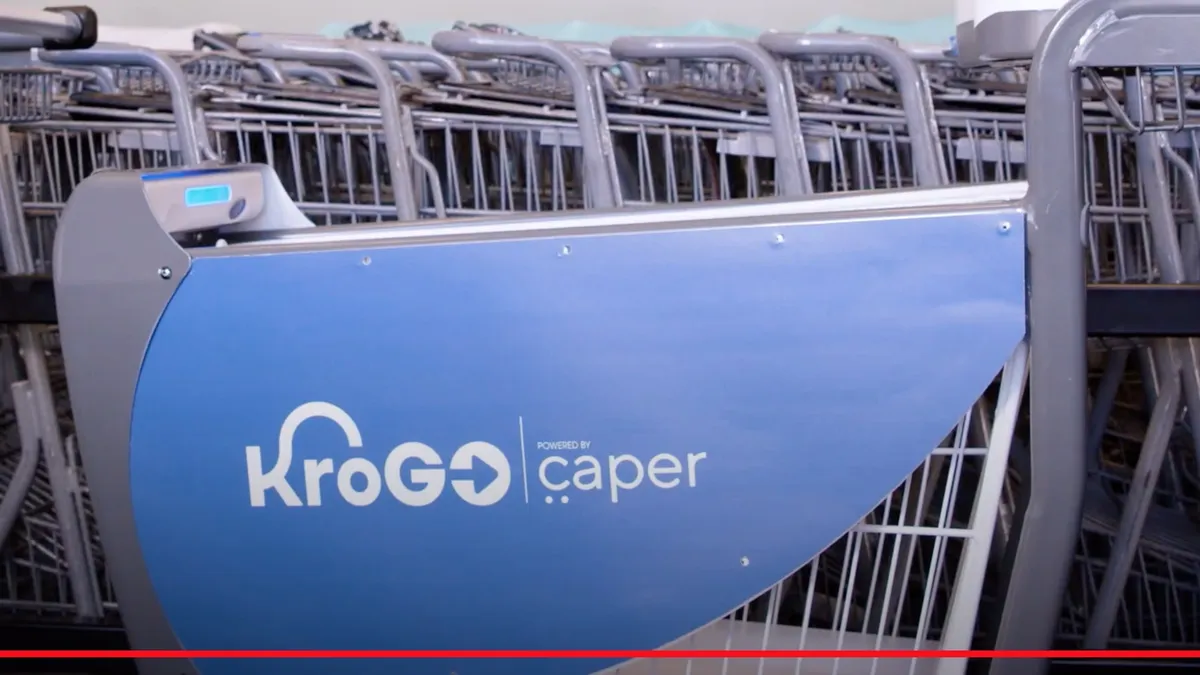Dive Brief:
- Kroger is currently testing a branded smart cart solution at a store in Cincinnati, a spokesperson for the company confirmed.
- KroGO branded shopping carts scan and weigh products, provide a running total on a digital screen and let shoppers check out using a payment pad on the cart. The technology, powered by smart cart company Caper, began testing at the Cincinnati store in the fall.
- The spokesperson declined to outline expansion plans for KroGO, though the branding effort indicates a wider rollout beyond just one store.
Dive Insight:
Kroger has shown a willingness in recent years to test out a raft of cutting-edge initiatives to keep pace with the likes of Walmart and Amazon, from pickup-only stores to 30-minute grocery delivery. Add to that list smart-cart technology, which has gained attention of late as it rolls out across Amazon Fresh stores.
The nation’s largest supermarket chain has gradually adopted new checkout technologies. It offers Scan, Bag, Go, a program that lets shoppers scan products with their phone or a store-provided handheld device, at around 430 stores and last year began accepting Google Pay and Apple Pay in addition to its own mobile wallet program, Kroger Pay. KroGO, the new service with its name emblazoned on each tech-enhanced smart cart, takes the next step by automating the tried-and-true shopping cart experience.
KroGO carts, news of which was first reported by Winsight Grocery Business, require shoppers to scan product barcodes before placing them inside. Items that must be weighed, like produce, are entered using the touch screen, with the cart automatically weighing each selection to determine the dollar value. Shoppers are encouraged to use reusable bags, which must be weighed by the cart before shopping, as well as their loyalty cards, which can be scanned in similar to a traditional checkout. When they’re finished, shoppers can exit the store through the self-checkout lane and leave their KroGO cart in the lobby.
Kroger promotes the KroGO carts on its site, as well as via a YouTube video posted in October. The carts currently don’t process gift cards, tobacco products, paper coupons or behind-the-counter pharmacy items. They also aren’t able to process payments through federal benefits programs Women, Infants and Children and the Electronic Benefits Transfer system.
Smart cart tests have cropped up at various North American retailers in recent years, and the technology got a major boost when Amazon Fresh stores unveiled the Dash Cart, which uses computer vision and sensors to log products as their placed inside. In addition to Caper, which has tested its carts at Sobeys in Canada, Seattle-based Veeve makes tech-enhanced carts similar to the Dash Cart.
Although they're attention-grabbing, smart carts face a steep challenge to the deliver incremental trips and business intelligence that justify their adoption at scale. They also may not be as intuitive and exciting for consumers as they are for tech companies and retailers.
"The common consumer may not fully appreciate the technology itself or may not be comfortable enough to fully utilize all of the features," Sylvain Charlebois, a professor of food distribution, policy and safety at Dalhousie University in Canada, who has researched smart carts, said in an interview last year.
Retailers are testing a variety of checkout innovations that speed up shopping and allow customers to skip the usual front-end experience, and that also deliver customer data to retailers. Amazon Go and close competitors like Standard, Trigo and Grabango outfit stores with an array of cameras and sensor technology while other firms have focused their innovation on a phone, cart or another device. Caper recently unveiled the Caper Counter, a cube-shaped device that automatically rings up products placed inside.
Caper's smart shopping cart can handle around 70 pounds worth of products and is 50% larger than Amazon’s Dash Cart, co-founder and CEO Lindon Gao said last fall. Although KroGO carts require shoppers to scan each product, Caper's prototype cart automatically recognizes items as they're lowered inside.
As of October, Caper had raised more than $14 million in funding from investors including Lux Capital, First Round Capital, Y Combinator and Instacart co-founder Max Mullen.













